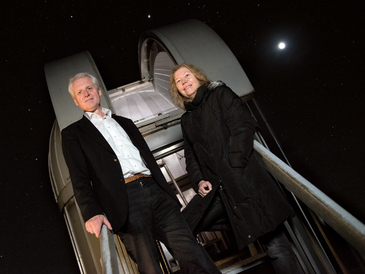It couldn’t be better: Deutsche Forschungsgemeinschaft (DFG) [German Research Foundation] has approved all the University’s applications for structured doctoral programs, i.e. research training groups, proposed by the University of Bremen. Among others, this means green light for a new research training group in the area of Materials Sciences to start on October 1, 2016: It will be set up in collaboration with Jacobs University Bremen, the University of Oldenburg, and the Max Planck Institute for the Structure and Dynamics of Matter, Hamburg. A new research training group will also be formed in the area of Industrial Mathematics. And the DFG Research Training Group “Models of Gravity”, which is run in cooperation with the University of Oldenburg, is to be prolonged.
“That translates into a one-hundred-percent success rate”, said the Rector of the University of Bremen, Professor Bernd Scholz-Reiter, on hearing the news. Results like these underline to what extent the Bremen University of Excellence and its cooperation partners stand out in the science landscape. And, of course, this new DFG funding stands Bremen in good stead for the pending third round of the Excellence Initiative as materials sciences and space research belong to the University’s specialties. For its part, industrial mathematics is an important cross-disciplinary field. All told, the DFG granted funding for 18 new research training groups over a period of four and a half years. This amounts to 74 million euros, about 12 million of which accrues to the University of Bremen (ca. 3.8 million euros for industrial mathematics and 4 million each for materials sciences and gravitational physics).
Overview of the University’s research training groups:
“Pi³” International Research Training Group for mathematicians
Mathematics is a universal language. By grasping the essentials, it is capable of making complex issues comprehensible in a way no other science can match. For example, such an abstract level of analysis allows researchers in the natural, life and engineering sciences to approach otherwise impossibly complicated tasks by means of mathematical modeling. Such models are also indispensible in industry and the economy. In the International Research Training Group “Pi³: Parameter Identification – Analysis, Algorithms, Implementations” led by Professor Peter Maaß (Center for Industrial Mathematics), postgraduate international students will receive training at the interface between applied mathematics and scientific computing. Career prospects both on the academic job market as well as the private sector are good. The new research training group is dedicated to specialist mathematical training and the promotion of independent research. Among the areas to be researched are innovative processes to optimize carburetor systems in automobile manufacturing, analysis of metabolite structures based on mass spectrometric data, and the optical analysis of fiber structures.
“QM³”: New methods of quantum mechanical materials modeling
The goal pursued by the new Research Training Group "QM³: Quantum Mechanical Materials Modeling” led by professors Thomas Frauenheim and Tim Wehling is to establish new possibilities for simulating the properties of materials on an atomic scale. QM³ is a collaborative effort involving the universities of Bremen and Oldenburg, Jacobs University Bremen, and the Max Planck Institute for the Structure and Dynamics of Matter, Hamburg. A large number of the properties exhibited by materials used in the chemicals industry and photovoltaics are subject to the laws of quantum mechanics and atomic structures. To understand and subsequently simulate such properties is an immense challenge as very often the complexity comes from different sources. The aim of this research training group is to create a completely new interdisciplinary structure for research and education in this field. Its structured doctoral program will combine the most important approaches to quantum mechanical modeling adopted by interdisciplinary research in the sciences. The research training group will contribute to establishing new methods of quantum mechanical materials modeling and apply them to current research questions.
Prolonged: “Models of Gravity”
The research training group with the title “Models of Gravity” is led by professors Jutta Kunz (University of Oldenburg) and Claus Lämmerzahl from ZARM, the Center for Aerospace Research and Microgravity at the University of Bremen. Over the past few years, this research training group has been successfully conducting research in the area of gravitational physics and training highly specialized young PhDs. “We are thrilled that we will now be able to continue the good work over the next four years”, say Kunz and Lämmerzahl. Besides the universities of Bremen and Oldenburg, the universities of Hanover and Bielefeld are also involved in this research training group, and the University of Copenhagen is participating as an external partner. http://www.models-of-gravity.org
The University of Bremen now hosts six research training groups
The new allocations and prolongation described above bring the number of structured doctoral programs at the University of Bremen up to a total of six – some of them operated in collaboration with other universities. The International Research Training Group INTERCOAST “Integrated Coastal and Shelf-Sea Research” was established in 2009. This was followed 2012 by “Models of Gravity”, that has now been prolonged for another four and a half years. In 2013 the Research Training Group “Micro- meso- and macroporous nonmetallic Materials: Fundamentals and Applications” (MIMENIMA) was set up as well as the International Research Training Group “ArcTrain – Processes and impacts of climate change in the North Atlantic Ocean and the Canadian Arctic”.
For more information on doctoral programs at the University of Bremen, please contact:
International Research Training Group
“Pi³: Parameter Identification – Analysis, Algorithms, Implementations”:
University of Bremen
Faculty Mathematics / Informatics
Center for Industrial Mathematics
Dr. Tobias Kluth
Phone: +49 421-218 63817
email: tkluthprotect me ?!math.uni-bremenprotect me ?!.de
Research Training Group
"QM³: Quantum Mechanical Materials Modeling”:
University of Bremen
Faculty Physics / Electrical Engineering
Institute for Theoretical Physics
Prof.Dr. Tim Wehling
Phone: +49 421 218-62039
email: wehlingprotect me ?!itp.uni-bremenprotect me ?!.de
Research Training Group
“Models of Gravity”:
University of Bremen
Center for Aerospace Research and Microgravity (ZARM)
Prof.Dr. Claus Lämmerzahl
Phone: +49 421 218-57834
cell: +49 175-5756992
email: claus.laemmerzahlprotect me ?!zarm.uni-bremenprotect me ?!.de

